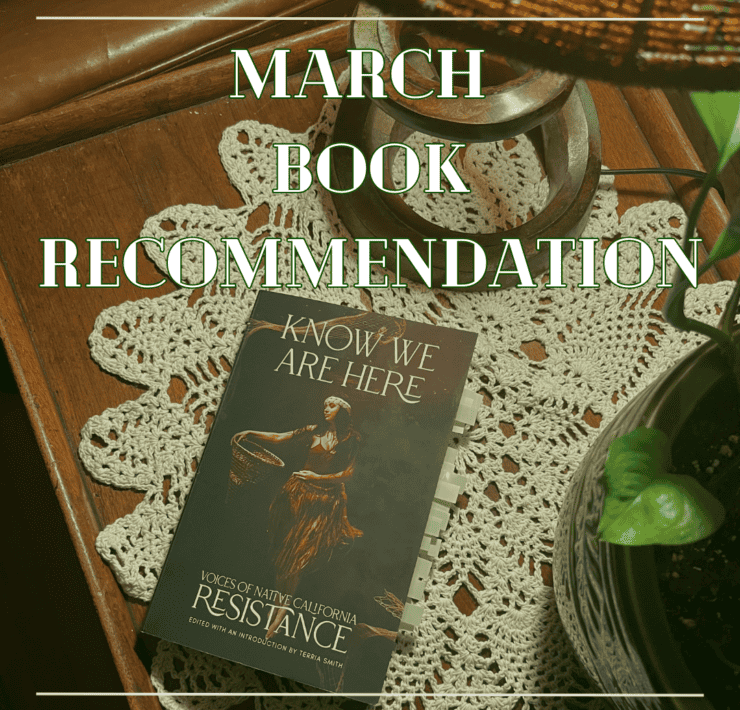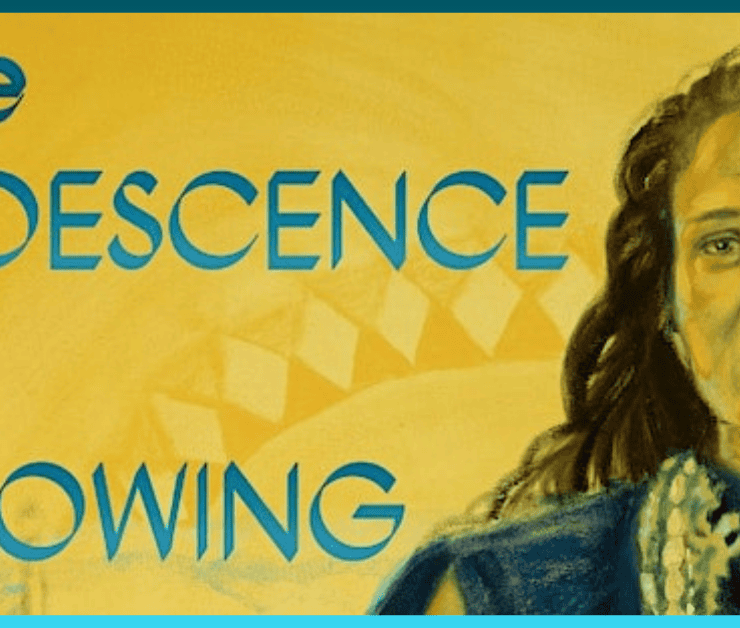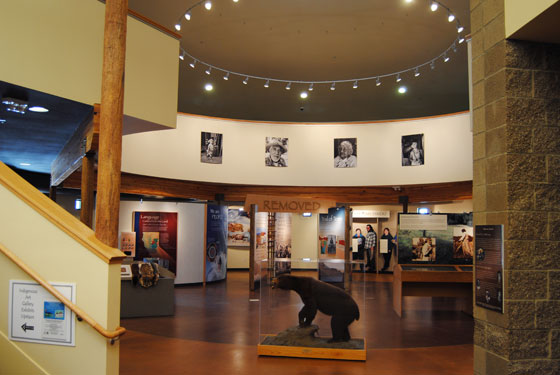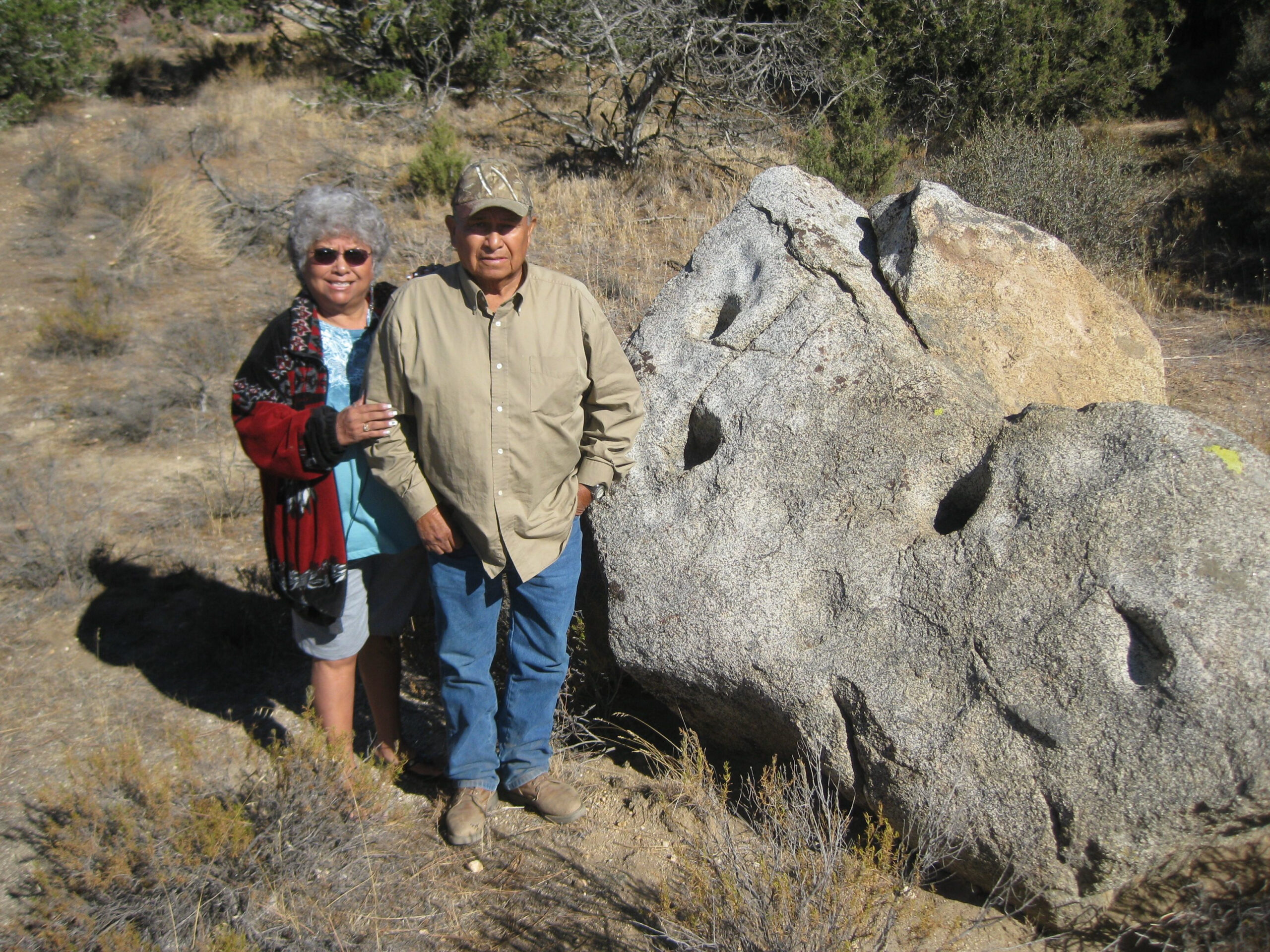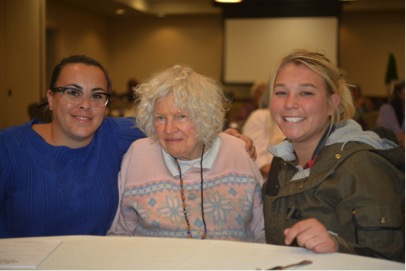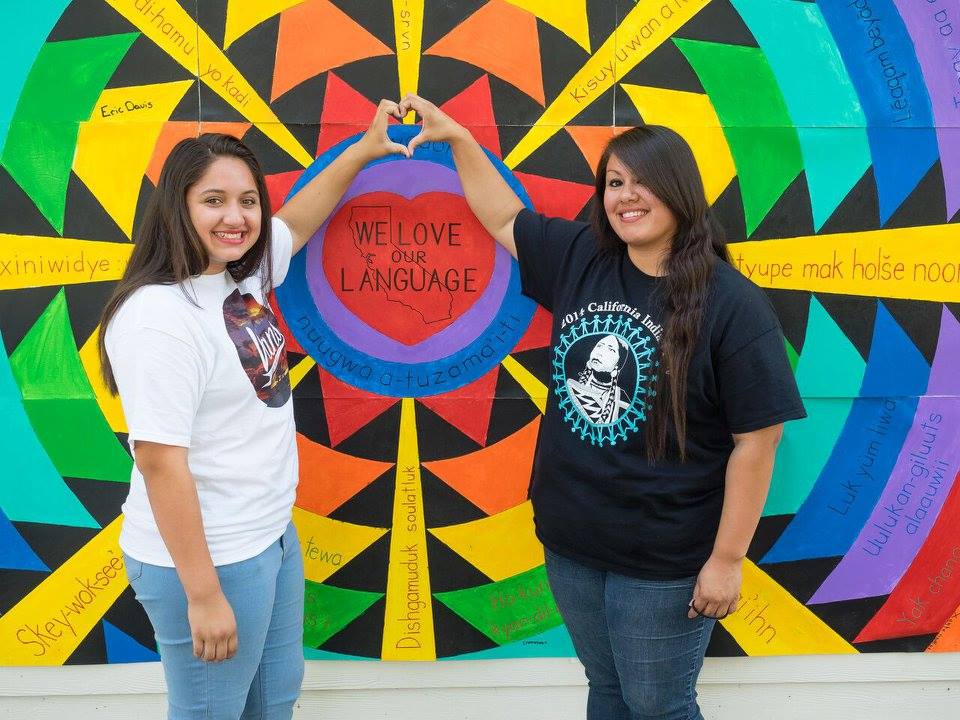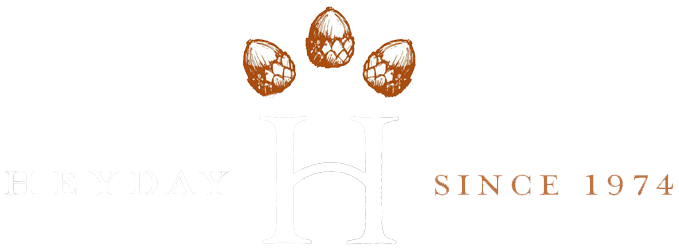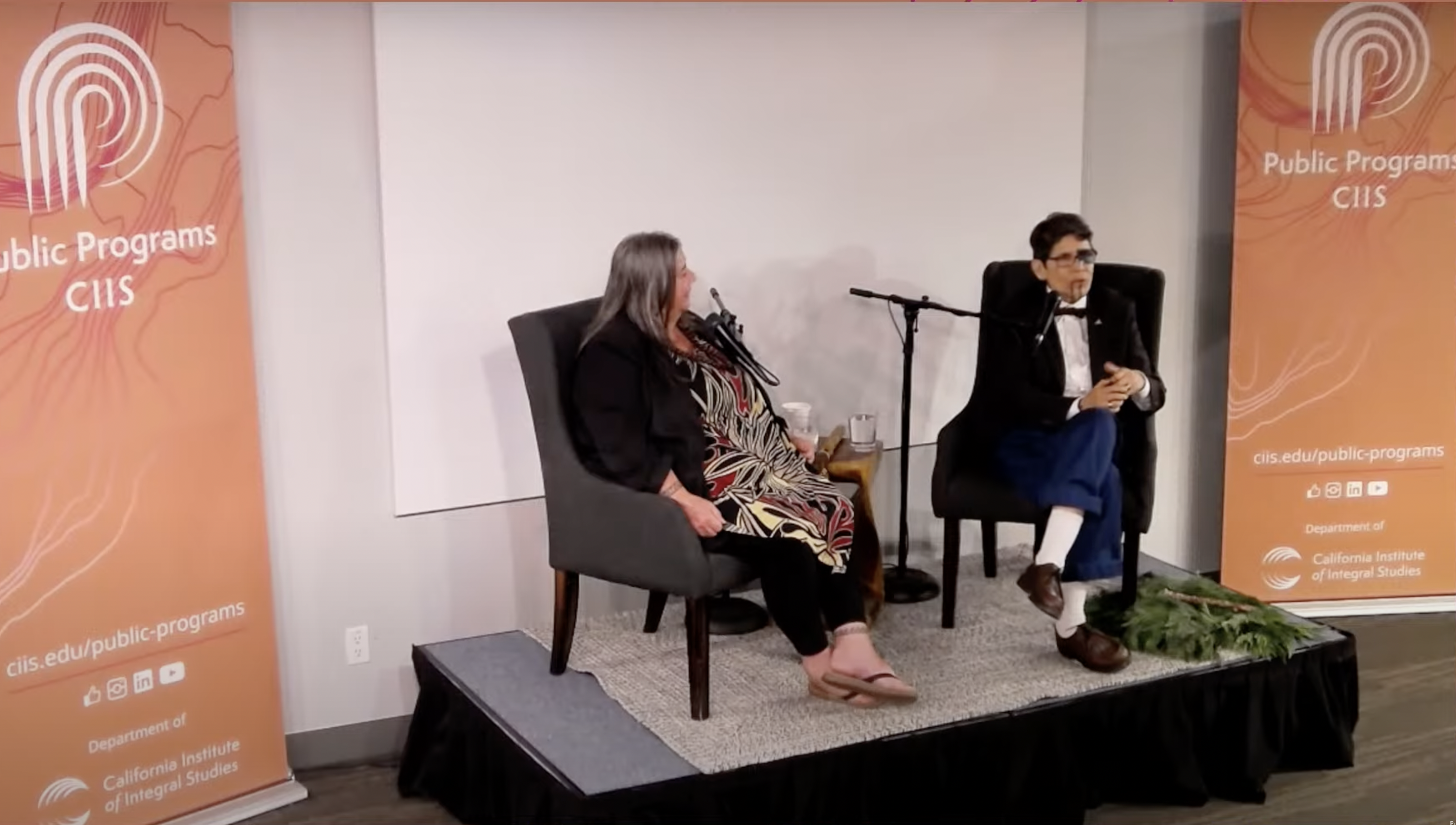
Reflecting on L. Frank Manriquez and Catalina Gomes’ discussion on Cultural and Language Revitalization at the California Institute of Integral Studies.
By Tavi Lorelle Carpenter
What is the importance of knowing a language? It’s something I’ve considered quite a bit within the past year, wondering what it would mean to know my own. Of course, if I did, I would know three other languages aside from english, which would be very cool. But of course learning a language is actually quite the endeavor and honestly even english, the only language I know, can be a struggle. Heck, this whole week, writing something for this blog has been painful. The words don’t want to come!
But during the law conference I attended on Monday (article coming soon!), I had the opportunity to hear one of my ancestral languages. It’s special to be able to hear one’s language, like when my Grandma will say the few words she knows in Wappo. I always want to slow the moment down to allow the words to wash over me and sink through my skin into my blood. My Grandma says knowing your language is a strength and she is right.
But the practicality of language learning can be very difficult.
If you’ve ever had to talk with a linguist (and lots of love to all the ones I know!), you know what I mean. I swear in any linguistics(ish) class I’ve had to take, it’s like I’m back in high school physics. Like I know they’re saying something and I’m sure it makes sense to someone, but heck if I know what’s going on.
I always thought I liked language but the truth is, I just like playing with it.
And I don’t really think I’m alone.
Not in the playing with language, but in the linguistics and language learning being difficult. And if that’s not true for you, congratulations, I’m genuinely wildly jealous. But I know I’m not the only one who finds language learning challenging.
For a long time I felt that learning any of my ancestral languages would never be a possibility for me.
I think that’s why I so thoroughly enjoyed listening to a conversation between L. Frank Manriquez and Catalina Gomes on Language and Cultural Revitalization, this past Wednesday in San Francisco at the California Institute of Integral Studies (CIIS). They reminded me that difficult does not mean impossible. Or to be a little harsher, challenging is not an excuse to not try.
I’ve been having a rather impressively low iron thing going on. Like basically the world is molasses right now and I’m a drowsy tortoise with overly sore muscles. All to say, I unfortunately was unable to attend in person, truthfully I really wish I had. But I am very grateful that CIIS was able to livestream the event, at least I was able to listen in.
Having recently graduated from college, I’m used to the lecture vibe. Lots of good info but unless I’m internally repeating the words spoken, my mind will be wandering out of the room. But this was not the case for this event! I was laughing and crying and hanging on the edge of my seat, it was exciting and inspiring.
The video can be seen on YouTube, I’m only going to reflect on two stories. I highly recommend taking the time to watch it. It’s about an hour and a half.
The guest panelists L. Frank Manriquez (Tongva, Ajachemem & Rarámuri) and Catalina Gomes (Ramaytush, Salinan and Bay Miwok), are both inspiring people you immediately want to know. L. Frank is a writer, tribal scholar, cartoonist and Indigenous language activist. Most recently, I had actually seen her work at the Oxy Arts Exhibit, “The Iridescence of Knowing”. She is also the co-founder of Advocates for Indigenous California Language Survival. Catalina Gomes, an elder dedicated to rematriation, had long found “refuge in the redwood forests living off the grid, establishing a closer relationship to the earth and the ocean” according to her bio. She is also the founder of the Muchia Te’ Indigenous Land Trust, named for her family matriarch, whose Native name was recorded in the Mission Dolores records, something quite rare, and certainly special for her family to be able to know.
The relationship between L. Frank and Catalina came across as being one of great respect and humorous interplay. What was also extremely special was that, both their ancestors being maritime, are also involved in canoe cultural revitalization.
L. Frank shared a story of taking out a canoe, the second of its kind in 300 years. She had invited everyone, including some folks who don’t like each other very much. But they worked together to bring the boat into the water.
It was an endeavor.
Their first challenge was the water itself as it was continually “swamping the boat”.
Then there was a lifeguard who approached them and shouted at them insisting that they were all going to die. L. Frank pointed out: “Here the whole community is listening to him scream, and they’re here doing this glorious reclamation of, of us, you know?”
It was a “15 minute effort” where everyone was working together in the “organized chaos” of the moment. But then it happened- the boat was in and ready to go! And everyone, including random spectators on the beach started cheering them on.
“The minute that they were able to shove it past the last wave the whole beach erupted in ‘paddle!’ as if they weren’t going to right? But ‘paddle!’ was the cry! And they paddled . . .and then they were gone, there was that three knots! And what it did, was it made people who are fighting each other, their whole lives and generations of it hug each other and claim victory. Victory over genocide.”
Catalina Gomes shared another story about the Hōkūleʻa, a canoe made in the traditional way of the first people of Hawai’i that has allowed for, in Catalina’s words, “a renaissance” of language and cultural revitalization in Hawai’i. Hōkūleʻa had come to visit this past Sunday to Half Moon Bay and as they made their journey, something phenomenal occurred:
“As they were coming down the coast passing our village site Timigtac, which, my first project in Breath of Life was to translate the name of our village, because tac at the end of a village name is a place reference. So we had to look to some neighboring languages to get to mig which means whale. So our village along Clara Creek, which is now known as Pacifica is ‘the place of whales’. And, Sunday, about noon, as the Hōkūleʻa was passing our village site, they were welcomed by two whales. Between their canoe and the shore, were two whales to greet them on their way to Half Moon Bay where we had a welcoming ceremony.”
It may be hard to see the connection to language from these two stories but I think with cultural revitalization, we find our way in by coming together and when we do, it is reaffirmed, just like the whales did off the coast of Timigtac. Furthermore, I think language often taught as a way of communicating and not a way of knowing our world. But there is so much that I’ve read that states quite firmly that part of knowing our ancestral languages is the way in which they offer us a view into our interconnectedness to the world we live in. As California Indian people, we are place-based people, the connectedness is important
So much of learning a language is so technical and it’s really hard for me to grasp the basics. I don’t think my mind knows how to think linguistically. I like stories and metaphors, that’s how I understand the world and I always have. But that doesn’t mean I shouldn’t shove off the responsibility of knowing my languages either. There was a final story, I want to share, I know I only said two, but bare with me.
L. Frank shared a story about her time in Australia:
“I went out to a women’s camp. . .and the women told me that the young girls don’t want to come to the Outback anymore and learn the dances. But if the older women go into town, dressed for Outback you know and painted. And if they touch you, then you are compelled and you now have to come back. . . I wish we had some compulsion stuff here you know, where I touch you, now you’ve got to learn language, now you’ve got to learn to dance!”
In my mind, I think back to what’s been shared with me, words of wisdom from my great-great Auntie Vernie who would say, “learn english really well and then come back and help your people”. She would say this to underline the importance of education. But I also think it was her way of touching the backs of the next generation to not forget where they come from, that we are all ancestors-in-training. So let’s work on being good ones.
I also want to highlight that things not being perfect or things being hard or things feeling impossible is a bad excuse for not trying. None of that should stop any of us from learning things we’d know if colonization hadn’t worked so hard to eradicate that knowledge.
And it’s not fair that we don’t have all the pieces.
But the pieces that have survived, they help us in being strong in ourselves, in our own communities and as California Indian people overall. So they are worth fighting for and we all have a responsibility to carry them on.
All right, I’m off my soap box. This week has been filled with a wealth of information, it’s been exciting, though I’m definitely still processing it all!
And just in time for Indigenous Peoples’ Day this upcoming Monday!
I will be celebrating with family at the Santa Rosa Junior College, come say hello if you see me! Then, later that day, I will be dealing with my low iron situation. No more molasses days for me!
It’s going to a great Indigenous Peoples’ Day!
To watch the full discussion on YouTube visit: Voices From California Indigenous Language & Cultural Revitalization I CIIS

